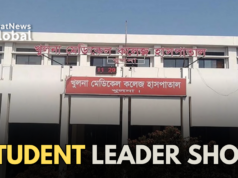Insurers faced losses after the 2020 Tokyo Olympics were postponed for a year due to the COVID-19 pandemic.
Since then, wars in Ukraine and Gaza and a spate of elections this year, including in France, have driven up fears of militant attacks and politically-motivated violence at high-profile global events.
The Olympics take place in Paris from July 26-Aug 11 and the Paralympics from Aug 28-Sept 8.
German insurer Allianz is insurance partner for the Games. Other insurers, such as the Lloyd’s of London market, are also providing cover.
“We are all aware of the geopolitical situation the world is in,” said Eike Buergel, head of Allianz’s Olympic and Paralympic programme.
“We are convinced that the IOC (International Olympic Committee), Paris 2024 and the national organising committees, together with the French authorities, are taking the right measures when it comes to challenges on the ground.”
The possibility of Islamist attacks are the top security worry for the Games, the Paris chief of police said last month.
“It’s such a large event … in a very large city, which in itself is quite difficult to police,” said Andrew Duxbury, head of contingency at insurer Beazley.
France has said it would move its opening ceremony from the River Seine if a specific security risk was confirmed.
A man was arrested in May in the French town of Saint-Etienne, suspected of planning an attack in the name of Islamic State at the city’s soccer stadium during the Olympics.
Adam Carrier, head of consulting at crisis management consultancy AnotherDay, said such incidents “demonstrate that the threat against the Paris Olympics is real and ongoing”.
Insurers met the IOC in Paris last month to discuss risk mitigation measures, two industry sources told Reuters.
Risk management was an “essential” part of the IOC’s work, reducing the likelihood that unexpected events would adversely affect the Games, the IOC said in an emailed statement to Reuters.
FLASHPOINT
Another flashpoint could be the Israeli team, insurance sources said. Israel will participate in the Games despite its military conflict in Gaza, in which 38,000 Palestinians have been killed.
Marcos Alvarez, managing director for insurance ratings at Morningstar, said militant attacks leading to loss of life, property damage and business interruption could “add several billions” to estimates of $3 billion in insurance losses if the Tokyo Olympics had been cancelled due to COVID-19.
The IOC buys its insurance several years in advance. It typically buys around $800 million in cover for each Olympic Games.
“Due to confidentiality clauses included in our agreements with our service providers, the IOC cannot disclose terms of its contracts,” it said.
“The insurance policy would come into effect under certain unexpected events, as history has already witnessed, to allow IOC to cover part of its operational cost.”
The Paris organising committee also buys insurance, as do national organising committees. Broadcasters, sponsors and travel firms are likely to buy their cover around a year in advance, while hospitality providers may buy insurance closer to the event.
Since the 9/11 attacks in New York in 2001, standard event cancellation policies have typically excluded terror attacks, but events organisers and businesses can buy separate cover.
Vulnerable companies can also buy cover against losses incurred by strikes, riots and civil commotion.
With Reuters inputs
Thirty eight years in journalism, widely travelled, history buff with a preference for Old Monk Rum. Current interest/focus spans China, Technology and Trade. Recent reads: Steven Colls Directorate S and Alexander Frater's Chasing the Monsoon. Netflix/Prime video junkie. Loves animal videos on Facebook. Reluctant tweeter.




